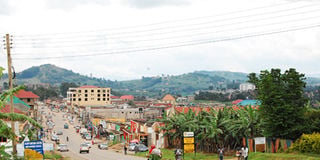Ishaka’s real estate market keeps growing

Ishaka became a place to be again. University students have a penchant to make a town great. Demand for all sorts of goods and services goes through the roof. Photo by Tony Mushoborozi
On May 27, 1980, former president Apollo Milton Obote was welcomed back home from exile in pomp. The historic event took place in Ishaka Town. This is about 3km west of Bushenyi District headquarters.
The military plane had flown from Tanzania and landed at Nyakisharara airfield in Mbarara District, where a motorcade was waiting. A large crowd of people were congregated at Ishaka, immersed in song and dance, all in praise of the beloved Nyamurunga. That is the name that the banyankole had given to Obote.
The president was accompanied by his wife Miria Obote and their children, among others. That Obote could choose a tiny trading centre in the countryside to host his long-awaited home-coming event is testament to how much political support and personal friendships he had in the area. He had lived in exile since 1971 when he was ousted by Idi Amin.
Ishaka Town
Ishaka Town would thus occupy an important place in Uganda during the Obote II regime. It was the place to be. However, with time, Ishaka Town became just another trading centre in the countryside. Until 2004.
KIU Western Campus
Kampala International University opened its western campus at the eastern fringes of the town. The campus was built to be home to the School of Health Sciences, and as such came with a hospital.
The development killed two birds with one stone.
The community received a much needed hospital and a market for their businesses.
And just like that, the town was reborn. Ishaka became a place to be again. University students have a penchant to make a town great. Demand for all sorts of goods and services goes through the roof.
The mere presence of young people and their attendant hormones living in a town makes it a desirable place to live and work overnight. Restaurants start making money. Night life becomes exciting. Farmers smile to the bank.
Peasants develop new aspirations. Such is the transformation that came to Ishaka.
Property market
The real estate market in Ishaka Town was changed forever. Residential rental properties that were hitherto dusty and deserted were lapped up in droves after the campus was opened. Rent incomes jumped to heights never before imaginable.
Over the years, as the students increased, more people invested in affordable rentals for students.
Abias Tumuramye a property broker in Ishaka is optimistic about returns on investment in the town.
“The engineering faculty was recently moved to this campus. And at 15 years, the campus is starting.”
Land prices
Land prices in the town are high because business people are constantly buying more land for expansion of their businesses. A plot (50 ft by 100 ft) in Ishaka goes for Shs20m according to Tumuramye.
“The more the plot is close to the main, the more the price rises. Some plots go for as much as shs40m. All the plots I am talking about can house affordable accommodation for students,” he says.
Rent
A single, self contained room in Ishaka goes for between Shs150,000 – 200,000. Double rooms range between Shs200,000 and Shs400,000. The lower the quality of property, the lower the rent paid. Some rooms are as cheap as shs80,000.
For those interested in investing in a restaurant or bar, commercial rent ranges between Shs400,000 and Shs 500,000.
Special opportunities
Because the land owners in Ishaka have realised the primeness of their land, many are unwilling to sell, according to Tumuramye.
“There is an arrangement that Ishaka people and investors have found workable. The investor is given the land to build affordable rentals on condition that the owner of the land takes half of the rentals. This is the easiest way for anyone interested in the real estate market in this town,” says Tumuramye.
While the town is sorounded by banana plantations, there will come a time when the surounding hills will be suburbs, with metropolitan homes and centres of hospitality.
Even a students’ hostel is possible. Not everyone wants to stay in the heart of the town. Noise is overrated.




